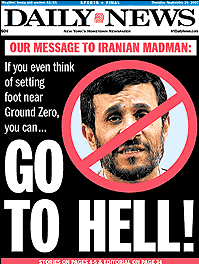The real story of Baghdad’s Bloody Sunday
By Kim Sengupta, The Independent, September 21, 2007
The eruption of gunfire was sudden and ferocious, round after round mowing down terrified men women and children, slamming into cars as they collided and overturned with drivers frantically trying to escape. Some vehicles were set alight by exploding petrol tanks. A mother and her infant child died in one of them, trapped in the flames.
The shooting on Sunday, by the guards of the American private security company Blackwater, has sparked one of the most bitter and public disputes between the Iraqi government and its American patrons, and brings into sharp focus the often violent conduct of the Western private armies operating in Iraq since the 2003 invasion, immune from scrutiny or prosecution.
Blackwater’s security men are accused of going on an unprovoked killing spree. Hassan Jabar Salman, a lawyer, was shot four times in the back, his car riddled with eight more bullets, as he attempted to get away from their convoy. Yesterday, sitting swathed in bandages at Baghdad’s Yarmukh Hospital, he recalled scenes of horror. “I saw women and children jump out of their cars and start to crawl on the road to escape being shot,” said Mr Salman. “But still the firing kept coming and many of them were killed. I saw a boy of about 10 leaping in fear from a minibus, he was shot in the head. His mother was crying out for him, she jumped out after him, and she was killed. People were afraid.”
At the end of the prolonged hail of bullets Nisoor Square was a scene of carnage with bodies strewn around smouldering wreckage. Ambulances trying to pick up the wounded found their path blocked by crowds fleeing the gunfire.
Yesterday, the death toll from the incident, according to Iraqi authorities, stood at 28. And it could rise higher, say doctors, as some of the injured, hit by high-velocity bullets at close quarter, are unlikely to survive. [complete article]
Iraq’s ‘Dirty Harrys’
By David DeVoss, Los Angeles Times, September 23, 2007
Blackwater. The name says it all, conjuring images of imminent danger, hidden predators and night terror. From the moment Blackwater USA arrived in Iraq to protect L. Paul Bremer III’s Coalition Provisional Authority until last week, when its guards killed 11 Iraqis and wounded 13 more while escorting a diplomatic convoy through Baghdad, the North Carolina-based private security company has been known for its swaggering image and “Dirty Harry” demeanor.
All the U.S. private security armies in Iraq may be cut from the same khaki cloth, but each has its own personality. When I arrived in the country in September 2004 as a senior information officer for the U.S. Agency for International Development, bodyguards with Kroll Inc., whose credo is “in risk there is opportunity,” met me at the airport. They were British and Irish veterans of Belfast’s “Troubles” and viewed terrorists with a world-weary stoicism.
Our convoy had pulled onto the airport highway and was heading for the Green Zone when three black Chevy Suburbans flashed past. The rear door of the trailing vehicle was open, and inside sat a man dressed in black cradling a large-caliber machine gun. Bandoleers crisscrossed his chest, several handguns and a large knife dangled from his weapons harness and an enormous handlebar mustache covered most of his face.
The look was designed to inspire dread, but it was carried to such cartoonish extremes that the man resembled Yosemite Sam more than the Terminator. “That’s Blackwater,” said the Kroll driver disdainfully. “You’ll see a lot of them while you’re here.” [complete article]
See also, U.S. repeatedly rebuffed Iraq on Blackwater complaints (WP) and Iraqis: Video shows Blackwater guards fired 1st (AP).

 …the US media have once again fallen victim to an orchestration of “enemy image” that aims to vilify, intimidate, deface and demonize a Middle Eastern leader who, ironically, has been unusually forthcoming in his expressions of warm feelings toward the American people (though not the US government and its policies).
…the US media have once again fallen victim to an orchestration of “enemy image” that aims to vilify, intimidate, deface and demonize a Middle Eastern leader who, ironically, has been unusually forthcoming in his expressions of warm feelings toward the American people (though not the US government and its policies).